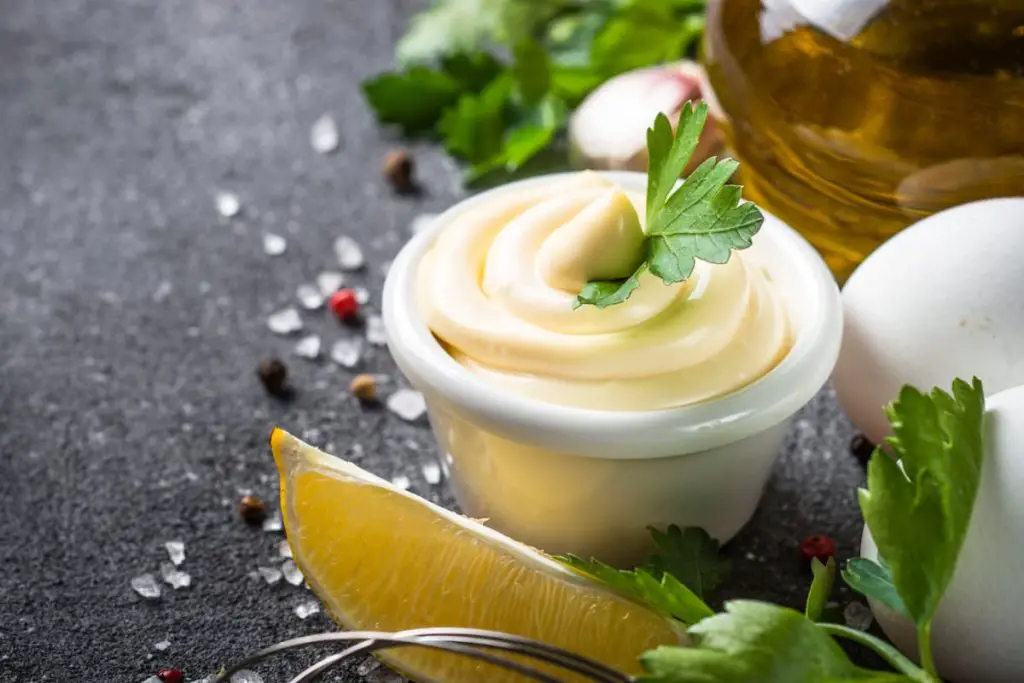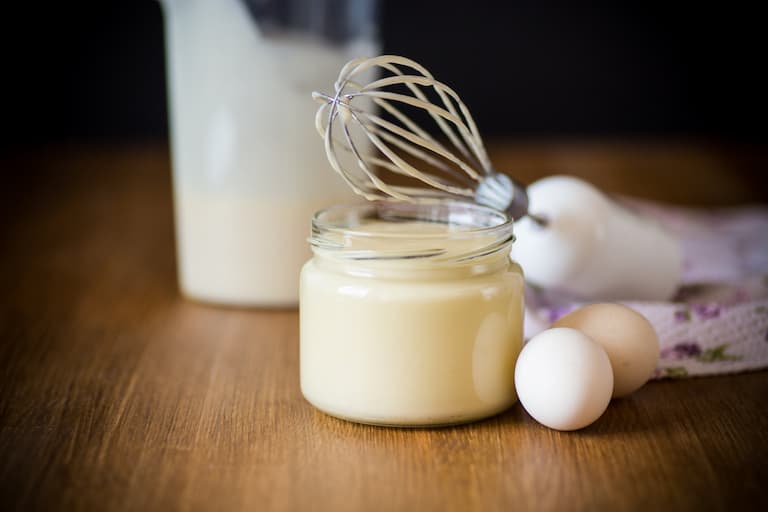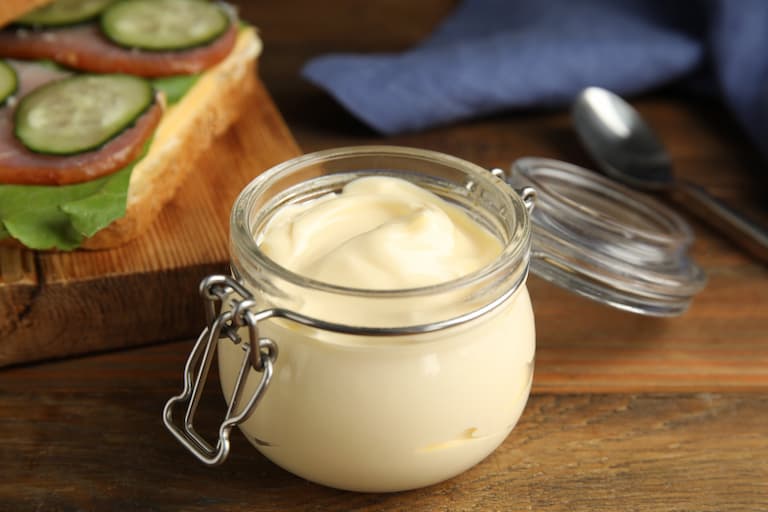You Can Freeze Mayonnaise (But Should You?)
Freezing food is an excellent way to prevent waste and save money, but some things don’t freeze as well as others. Freezing mayonnaise is one of those things that sounds good in theory, but will you be happy with the results?
You can freeze mayonnaise by placing it in a freezer-safe container. However, the texture and taste of mayonnaise will change drastically after being frozen and defrosted, so it’s not always worth the effort. The most common issue that occurs after freezing is the separation of the ingredients.
In this article, I will discuss freezing mayonnaise in greater detail. Keep reading to learn all there is to know about freezing mayonnaise!

What Happens When You Freeze Mayonnaise?
When you freeze mayonnaise, the ingredients tend to separate. You’ll see oil at the top of the container and the remaining ingredients at the bottom once it thaws. However, you can fix it by mixing the mayonnaise vigorously once it’s fully defrosted.
The separation occurs because of the oil and water in mayonnaise. You may already know that oil and water never mix. But if you don’t know why, it’s because oil is nonpolar and water is polar.
Polar and nonpolar liquids never fully mix, and this is what causes separation.
Luckily, mayonnaise contains a natural emulsifier in the form of egg yolks. Generally, the egg yolks in mayonnaise can control the separation, which is why you’ve likely never noticed any separation in your mayo that comes out of the fridge.
However, the freezing and thawing process makes the separation much more likely and apparent. For some, this isn’t an issue, but for others, this could be a turn-off. You can try to reconstitute the mayonnaise by mixing it, and this will mostly solve the problem.
How To Freeze Mayonnaise
Now that you know how freezing can affect mayonnaise, you might still want to know how to do it. So if you don’t have an issue with your mayonnaise separating after being frozen, you can read below for a guide on how to freeze mayo.
- Place the mayonnaise in a freezer-safe container. An ideal container for mayonnaise is a glass jar, but anything solid should work. You can either freeze it in one big portion or freeze it in smaller quantities in separate containers.
- Write the date on the jar. You should put the freezing date on the jar, which is a good idea if you’re forgetful or freeze a lot of food.
- Place the mayonnaise in the freezer. You can keep mayonnaise in the freezer for 2-3 months, but it’s best to use it as soon as possible.
How To Defrost Mayonnaise
The best way to defrost mayonnaise is to use the refrigerator. It’s the safest method because it keeps the food cool, making bacterial growth slower. Leaving your mayonnaise to defrost at warm temperatures could make it rancid quickly, so you should avoid warm temperatures, including room temperature.

Once the mayonnaise is defrosted, you might notice some separation. In this case, the thing to do is to mix it back together.
You can do this with one of the following:
- Fork
- Whisk
- Blender
Forks work best for smaller portions of mayonnaise. Mix as vigorously as possible until the mayo is back to normal. Of course, if you’re using a whisk, it’s the same concept as with a fork. Wisk vigorously until the mayonnaise looks uniform and there’s no separation.
Using these two methods will get your mayonnaise back to about 90% normal looking. Using a blender or electric mixer, however, will do a better job.
A blender is easy, as all you need to do is blend until the mayonnaise is well mixed. It shouldn’t take long, so you should keep a close eye on it while you’re mixing and stop when the desired consistency has been reached.
How Long Can You Freeze Mayonnaise?
You can freeze mayonnaise for around 2-3 months if you want to salvage any quality. Leaving it frozen any longer will significantly affect the taste and texture, making it a waste of time. You should only freeze mayonnaise if you plan on using it sooner rather than later.
Technically, it would be safe to eat mayonnaise if you froze it for longer than three months, but it wouldn’t taste like the mayonnaise you’re used to. The texture would also be different, and it would be an overall unpleasant experience.
That’s why it’s usually more worthwhile to forget about freezing mayonnaise and either buy a new jar or freeze it for as short a period as possible.
Is It Safe to Freeze Mayonnaise?
It’s safe to freeze mayonnaise, as long as you freeze it before it gets too close to its expiration date. Since freezing pauses all bacterial growth, your mayonnaise won’t become contaminated while in the freezer. However, the overall quality will diminish.
If you freeze it too close to the expiration date, or past it, there’s a chance that there are already harmful bacteria growing. If that’s the case, freezing won’t kill this bacteria, so you shouldn’t freeze it.
But if you freeze it before you open it, or if the expiry date is far away, it is entirely safe to freeze mayonnaise.
Can You Freeze Homemade Mayonnaise?
You can freeze homemade mayonnaise just like you’d freeze store-bought mayonnaise. However, homemade mayonnaise is also susceptible to separation during the freezing and thawing process. There’s no way to avoid this, so you should only freeze it if you have to.
The freezing process of homemade is the same as store-bought mayonnaise. So, you can follow the guide above if you wish to freeze yours.
Is It Worth It to Freeze Mayonnaise?
It isn’t worth it to freeze mayonnaise in most cases because it causes a severe decrease in its quality. The liquid separation that occurs is difficult to fix, so you might waste your time trying to get it to work. It is only worth it to freeze mayonnaise if you have no other choice.
As long as you’re okay with losing some quality, you can freeze mayonnaise without any concerns or issues. So, if you want to save money and extend your mayonnaise’s shelf life, freezing might sometimes be worth it.

Where Should I Store Thawed Mayonnaise?
You should store thawed mayonnaise in the refrigerator, as this will make it last as long as possible. Keeping it at room temperature in your kitchen or pantry will make it more susceptible to bacterial growth, decreasing shelf life.
The same goes for any mayonnaise that has been opened, even if it hasn’t been frozen. Any opened jar of mayonnaise is always best kept in a refrigerator, where the temperature remains nice and cool.
Can You Freeze Foods Made With Mayonnaise?
Yes, you can freeze food made with mayonnaise but the dishes will suffer from the same separation issues caused by the mayo when it thaws.
Freezing food that includes mayonnaise as an ingredient is a somewhat hit-or-miss proposition. It really depends on how much mayonnaise was used in the initial recipe.
For dishes that contain just a spoonful of mayonnaise, freezing probably won’t present much of a concern. Food that features mayonnaise as a more prominent ingredient will have the same problem as freezing mayo on its own. A great deal of separation will occur when thawed.
The real determining factor will depend on the specific dish, as many dishes will not lend themselves to being mixed well enough to reconstitute the mayonnaise. Take potato salad, for instance, mayonnaise is a major ingredient and it may be tough to mix it sufficiently to fix the separated ingredients.
Can You Freeze Mayonnaise – Conclusion
You can freeze mayonnaise, but you should only do it if you have no other option. During the freezing and thawing process, mayonnaise is likely to separate which creates an unappealing look, taste, and texture.
If you decide to freeze your mayonnaise and notice separation afterward, mix it back together using a fork, whisk, or blender. If that doesn’t work, your best bet is to throw it away and buy a new jar of mayonnaise.
You’ll probably be better off storing your mayonnaise in the refrigerator. Doing this will increase its shelf life and slow the growth of bacteria.






